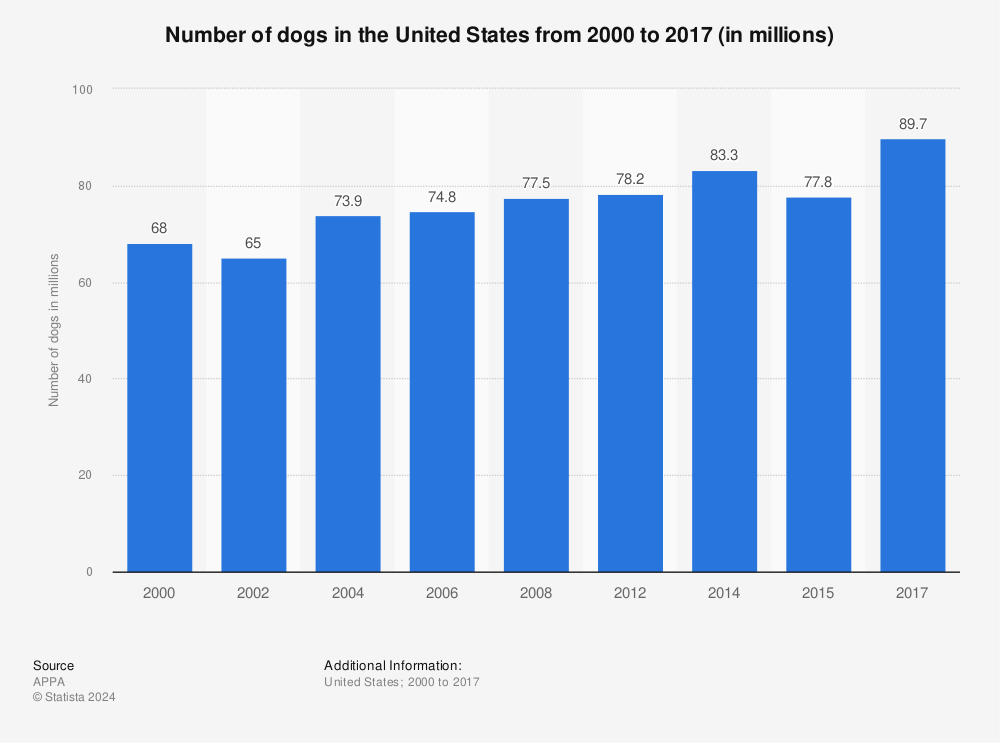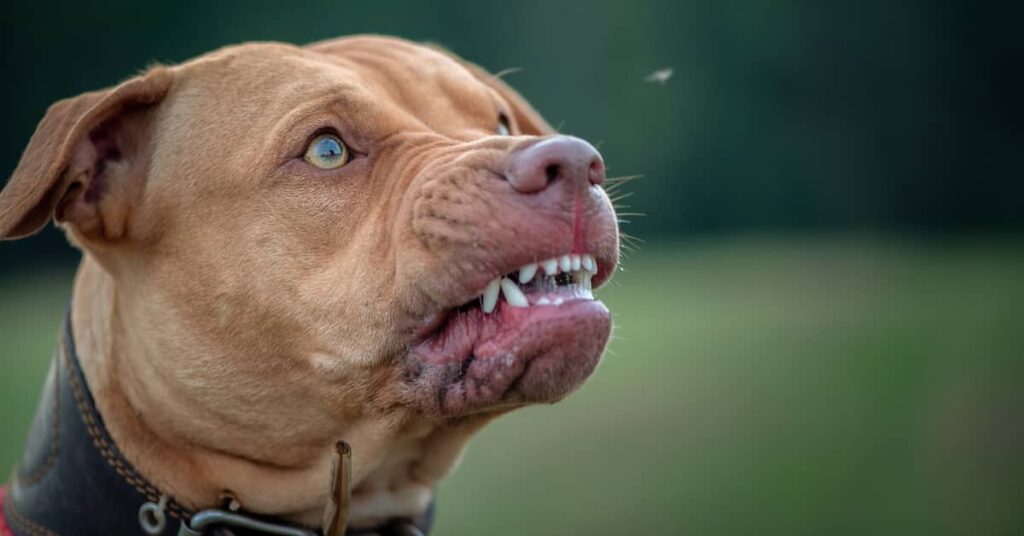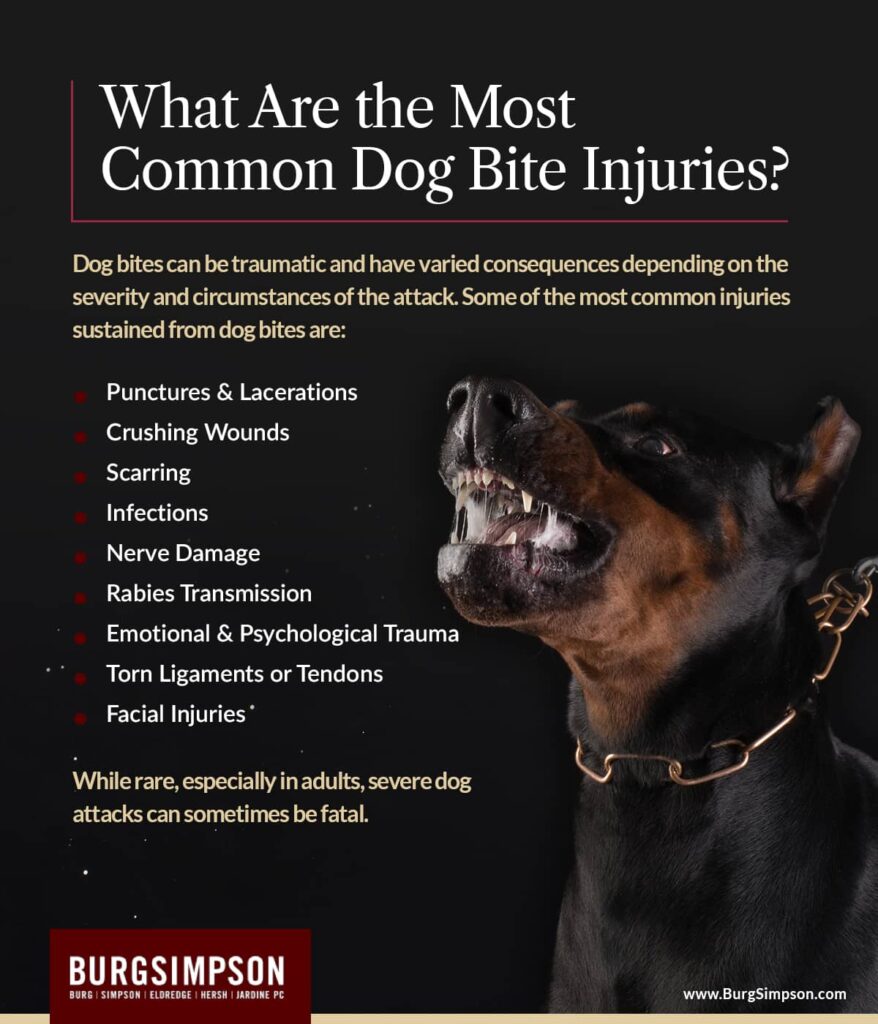Dog Bite Attorney Serving Our Neighbors in Denver, Englewood & All of Colorado
There is little doubt that we are a nation of dog lovers, and the Denver dog bite injury lawyers at Burg Simpson Law Firm are, too. There were 89.7 million canine companions in this country as of 2017, and the pandemic of 2020 prompted many more to adopt a buddy.

With puppy love being this common, it might come as a surprise that a dog bites someone every 7 seconds—about 4.5 million bites a year—sending about 1 in 5 victims to emergency rooms and urgent care centers. An estimated 51% of dog bite victims are children, particularly those aged 5 to 9. Sadly, 80% of these attacks occur in the home rather than by an unfamiliar dog.
Playing into the unfortunate stereotype, dogs regularly attack postal workers as well. More than 5,300 postal workers in the U.S. were attacked by dogs in 2022. Denver saw 19 of those attacks, with Colorado ranking 17th in the nation for dog attacks on postal service employees.
Though we love our precious pups, dog bites and attacks can be lethal in the worst case and emotionally scarring in the least. Even though negligent owners are often to blame, these incidents can occur regardless of the animal’s environment.
Each dog bite incident is as unique as the dog’s personality and the owner’s behavior. Each case has its own set of factors that will dictate any settlements or judgments and subsequent verdicts. Burg Simpson’s Denver dog bite injury lawyers are committed to helping dog bite victims.
We are locals with the know-how that comes with living along the Front Range, but we also have the strength of a national firm. As Good Lawyers. Changing Lives.®, we strive to advocate for clients suffering in the aftermath of a dog attack.
If you or a loved one has been injured by a dog bite, we understand the challenges you are facing. Our dog bite injury attorneys can help to secure the justice and compensation you deserve. Contact us online or call 303-792-5595 for a FREE and confidential case evaluation. We represent our neighbors in Denver, Englewood, and throughout Colorado.
Dog Bites Matter
Dogs are an integral part of many households. Yet, when they become aggressive, the consequences can be severe. Injuries can range from superficial scratches to scars, lasting psychological trauma to more severe wounds, and even death. Every victim deserves compensation for such unforeseen anguish, especially when another party’s negligence is to blame.
What Are the Most Dangerous Dog Breeds?
Discussing “dangerous” dog breeds can be a sensitive topic, as many factors influence a dog’s behavior beyond its breed alone. Factors like upbringing, training, treatment, and temperament play a significant role.
Nevertheless, over the years, certain breeds have been associated with a higher number of reported incidents, often due to their size, strength, or inherent protective nature. It is essential to remember that the breed does not necessarily determine a dog’s aggression level; each dog is an individual.
Here is a list of breeds commonly mentioned in various reports and studies:
Pit Bull
This breed, or mix of breeds, often tops lists due to its powerful build and history of incidents. Many pit bull owners and advocates stress the importance of individual dog evaluation over breed generalization.
Rottweiler
Known for their strength, rottweilers can be loyal and protective; however, without proper training or if subjected to mistreatment, they can become aggressive.
German Shepherd
As one of the most popular breeds in the U.S., German shepherds are known for their intelligence and loyalty. They are frequently used in police and security roles, which can contribute to their perceived aggressiveness.
Husky
These energetic and independent dogs are often involved in dog bite incidents, especially when they are not given the physical activity they require.
Alaskan Malamute
Like the husky, they require a lot of exercise and can become aggressive when their needs are not met.
Doberman Pinscher
Once trained as guard dogs, their protective nature can lead to aggressive tendencies if not properly socialized.
Chow Chow
Though smaller in stature, this breed can be very territorial and protective.
Great Dane
Their sheer size can make them a risk if they are not adequately trained or socialized.
Boxer
Known for being energetic and playful, they can inadvertently cause harm without proper training.
Akita
Originally bred for hunting and protection, Akitas can be reserved and very protective.
While these breeds might be mentioned more often, it is vital to stress that any dog can bite or show aggression regardless of breed. Throughout Colorado, there have been various dog bite incidents involving many different breeds.
Some steps that can help to prevent dog bites include:
- Responsible ownership
- Proper training
- Early socialization
- Understanding a dog’s individual temperament
If you or a loved one has been injured due to a dog bite in Denver, Englewood, or anywhere in Colorado, it is prudent to consult a dog bite lawyer. This ensures the victim understands their rights and the potential compensation available under local statutes.

Are There Dog Breed Restrictions in Colorado?
In Colorado, no statewide breed-specific legislation (BSL) bans or restricts certain breeds of dogs. Municipalities within Colorado have the autonomy to implement their own breed-specific laws or regulations. The state’s stance on dog breeds reflects the increasing consensus among animal professionals that breed-specific bans are not an effective or fair solution for preventing dog attacks.
Nevertheless, some cities in Colorado have, at various times, had breed-specific restrictions or bans, mainly targeting breeds such as pit bulls. Many cities have now repealed those restrictions.
The City of Denver had a longstanding ban on pit bulls; however, in 2020, Denver voters chose to lift the ban. It was replaced with Denver’s Ordinance § 8-67, allowing pit bulls but with specific licensing requirements. Owners must get a permit, microchip their pit bulls, and keep them on a leash in public. There are also restrictions on the number of pit bulls one can own.
Residents and potential dog owners in Colorado should always check with local ordinances and regulations in their specific municipality or county to understand any existing breed-specific rules. Understanding local laws is necessary to avoid unintentional violations.
Moreover, regardless of breed, owners are responsible for ensuring their pets are well-trained, socialized, and restrained as necessary to prevent potential harm to others. When accidents happen, the consequences can be grave—both for the victim and the dog owner.
Dog Bites & Children
Dogs often hold a special place as playful companions and loyal protectors of children. This bond also brings with it a potential risk. Due to their smaller size, natural curiosity, and sometimes unpredictable behavior, children are disproportionately affected by dog bite injuries. Understanding this dynamic is crucial for parents, caregivers, and dog owners alike.
Children, especially those under 10, are at an elevated risk of dog bite injuries. Due to their shorter stature, the child’s face, neck, or head is often within easy reach when a dog jumps or lunges. This can result in more severe injuries compared to bites on limbs.
Many dog bite incidents involving children occur during everyday activities and often with dogs they know. Common scenarios include:
- Trying to pet or hug a dog while it is eating or sleeping
- Startling a dog, intentionally or unintentionally
- Running or screaming around an anxious dog
- Approaching an unfamiliar dog without supervision
When children are bitten, the consequences can be severe:
- Physical trauma, including puncture wounds, lacerations, bone fractures, and facial injuries
- Risk of infections, given that children may not communicate or even recognize the early symptoms
- Long-term psychological effects, including a phobia of dogs or post-traumatic stress
Education and supervision are paramount. Teach children the following:
- Always ask permission from a dog’s owner before approaching.
- Avoid sudden movements or loud noises around dogs.
- Never disturb a dog that is eating, sleeping, or caring for puppies.
- Understand dog body language. A wagging tail does not always mean a dog is friendly.
In Denver, Englewood, and throughout Colorado, dog owners are held strictly liable for dog bite injuries, especially when it involves minors. If a child is injured, the dog’s owner may be held responsible for medical expenses and other damages.
For families affected by a dog bite incident involving a child, the road to recovery can be emotionally and financially challenging. You need to understand your legal rights and the potential for compensation.
In situations as sensitive as these, it is not just about seeking compensation but ensuring that the child receives the necessary support and care to heal and move forward. The dog bite injury lawyers at Burg Simpson possess a deep understanding of the local statutes and have a proven track record in representing victims effectively.
What Is the Dog Bite Law in Denver?
Like the rest of Colorado, Denver has specific laws and regulations governing dog bites to protect residents and visitors alike (C.R.S. § 13-21-124). Understanding these laws is crucial if a dog has bitten you or a loved one within the city limits.
First and foremost, it is important to note that Colorado, and by extension Denver and Englewood, is a strict liability state when it comes to dog bites. This means that a dog owner can be held liable for damages when their dog bites someone, regardless of whether the dog has been aggressive or has bitten someone in the past.
This is unlike the one-bite rule in some other states, where the owner is often protected from liability if the dog has never shown aggressive tendencies before.
While the strict liability rule can hold dog owners accountable for bites, there are exceptions:
- If the person bitten was unlawfully on the private property of the dog’s owner
- If the person bitten provoked the dog
- If the dog was performing its duties as a police or military dog
Colorado’s strict liability law specifically addresses bites that result in serious bodily injury. For injuries not caused by bites (e.g., if a dog knocked someone over) or for bites that did not result in serious injury, the victim might still be able to pursue a claim based on negligence.
Denver’s Leash Laws
Denver has its own municipal codes that mandate dogs to be on a leash in public places, with certain exceptions like designated dog parks. Owners who violate these leash laws and have their dogs involved in an incident can face penalties and could be deemed negligent in a dog bite case.

Can I Sue for a Dog Bite in Colorado?
Yes, you can sue for a dog bite in Colorado. The Centennial State has strict liability laws when it comes to dog bites. Under Colorado law, specifically C.R.S. § 13-21-124, dog owners are liable for damages if their dog bites someone, whether it is the first time the dog has bitten or not. This means that even if the dog had never displayed aggressive behavior before, the owner can still be held responsible for any injuries caused.
It is critical to understand that, as stated above, this strict liability applies if the person bitten was lawfully on private or public property at the time of the bite. If someone provokes the dog or trespasses on private property, the dog’s owner may have defenses to liability.
In addition to the strict liability statute, an injured party might also have claims based on negligence, premises liability, or violations of local animal control ordinances. It is important to consult with an experienced Denver dog bite injury attorney to navigate the complexities of these claims.
If you or a loved one has suffered a dog bite injury in Colorado, knowing your rights and the potential compensation you can receive is vital. This could cover medical expenses, pain and suffering, and even lost wages. Remember, at Burg Simpson, our dedicated team stands ready to assist you in every step of your dog bite claim.
One Bite-Rule vs. Strict Liability
For years, Colorado followed the “one-bite rule,” an historical legal principle that held the owner of a domesticated animal strictly accountable for any harm caused by the animal if the owner was, or should have been, aware of the animal’s prior dangerous or aggressive behaviors.
This rule placed the burden of proof on the injured party when seeking compensation. Colorado joined the majority of other states in 2005 when it abandoned this outdated law in dealing with dog bites.
What Are the Most Common Dog Bite Injuries?
Dog bites can be traumatic and have varied consequences depending on the severity and circumstances of the attack. The extent of damage largely depends on the size, strength, and behavior of the dog. Some of the most common injuries sustained from dog bites are:
- Punctures & Lacerations
- Crushing Wounds
- Scarring
- Infections
- Nerve Damage
- Rabies Transmission
- Emotional & Psychological Trauma
- Torn Ligaments or Tendons
- Facial Injuries
While rare, especially in adults, severe dog attacks can sometimes be fatal.
In the aftermath of a dog bite, timely medical attention is crucial to treat immediate injuries and prevent complications.
What Types of Damages Can I Seek in a Dog Bite Case?
If you or a loved one has been bitten by a dog in Denver, Englewood, or anywhere in Colorado, you may be entitled to seek various types of damages. Typically, victims of dog bites can seek the following damages:
- Medical Expenses
- Lost Wages
- Pain & Suffering
- Property Damage
- Permanent Scarring or Disfigurement
- Loss of Consortium
Understanding which types of damages apply to your case can be complex, given the intricacies of Colorado’s laws around dog bites. Having a practiced dog bite attorney at your side can ensure you receive the maximum compensation due.
How To Negotiate a Dog Bite Settlement
After suffering from a dog bite in Denver, Englewood, or any part of Colorado, you might find yourself overwhelmed not just by the trauma and medical implications but also by the process of securing a fair settlement. A pivotal piece of advice from our Denver dog bite injury lawyers at Burg Simpson: Do not attempt to negotiate directly with an insurance adjuster without the guidance of a skilled attorney.
Soon after the incident, you will likely be contacted by the dog owner’s insurance company. Their goal is to settle quickly and for as little as possible. They might present a friendly demeanor, but remember: their objective is to save the insurance company money, not look out for your best interests.
An adjuster will ask for your account of the event. Be cautious! Anything you say can be used to diminish your claim. Without attorney intervention, insurance adjusters might undervalue or dismiss certain aspects of your claim.
Adjusters are negotiators trained to minimize settlements. They often push for rapid settlements, hoping victims will accept less than they deserve. A talented dog bite injury attorney knows these tactics and will counteract them, fighting diligently for your rightful compensation.
Remember: Insurance adjusters have the backing of large companies and experienced legal teams. It is essential to level the playing field by contacting a knowledgeable dog bite lawyer.
Contact a Denver Dog Bite Injury Lawyer at Burg Simpson Today
If you or a loved one has suffered a dog bite injury in Denver, Englewood, or other parts of Colorado, navigating the aftermath can be daunting. From medical bills to emotional trauma, the challenges are many.
A Denver dog bite injury lawyer at Burg Simpson Law Firm can guide you through the legal complexities, ensuring you understand your rights and potential avenues for compensation. Remember, ensuring justice is not just about immediate medical expenses but also about addressing long-term physical and emotional scars.
If you think you have a dog bite claim, call us at 303-792-5595, contact us online, or fill out a Free Case Evaluation form. Our consultation will remain confidential. We are Good Lawyers. Changing Lives.®, and we will use our local clout and national resources to ensure that all paths to rightful dog bite compensation are explored.





